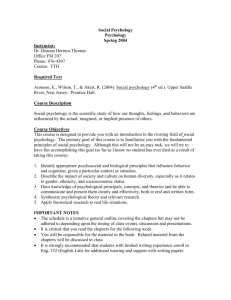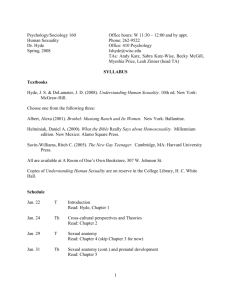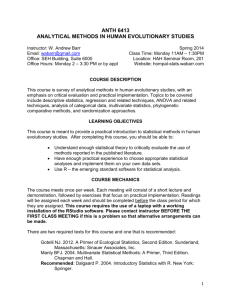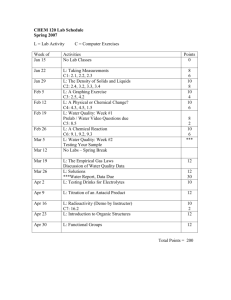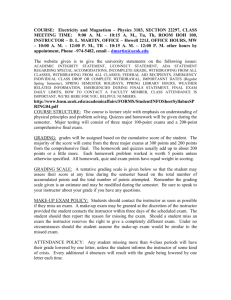411 Current Topics - Psychology Instructor: Professor Anthony
advertisement
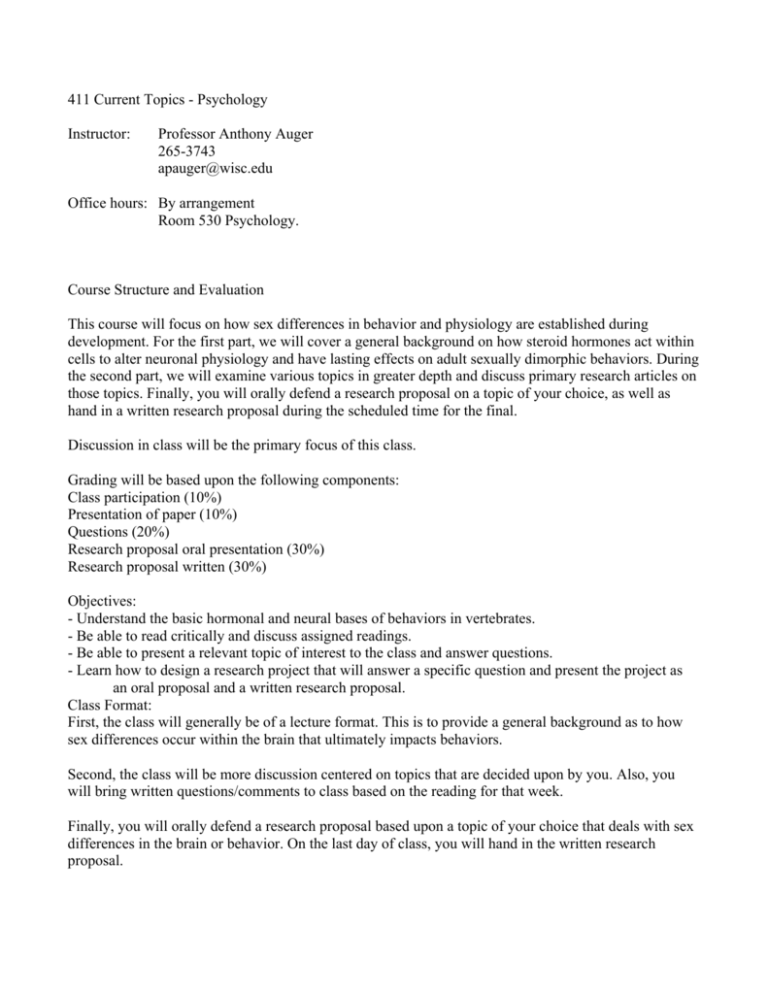
411 Current Topics - Psychology Instructor: Professor Anthony Auger 265-3743 apauger@wisc.edu Office hours: By arrangement Room 530 Psychology. Course Structure and Evaluation This course will focus on how sex differences in behavior and physiology are established during development. For the first part, we will cover a general background on how steroid hormones act within cells to alter neuronal physiology and have lasting effects on adult sexually dimorphic behaviors. During the second part, we will examine various topics in greater depth and discuss primary research articles on those topics. Finally, you will orally defend a research proposal on a topic of your choice, as well as hand in a written research proposal during the scheduled time for the final. Discussion in class will be the primary focus of this class. Grading will be based upon the following components: Class participation (10%) Presentation of paper (10%) Questions (20%) Research proposal oral presentation (30%) Research proposal written (30%) Objectives: - Understand the basic hormonal and neural bases of behaviors in vertebrates. - Be able to read critically and discuss assigned readings. - Be able to present a relevant topic of interest to the class and answer questions. - Learn how to design a research project that will answer a specific question and present the project as an oral proposal and a written research proposal. Class Format: First, the class will generally be of a lecture format. This is to provide a general background as to how sex differences occur within the brain that ultimately impacts behaviors. Second, the class will be more discussion centered on topics that are decided upon by you. Also, you will bring written questions/comments to class based on the reading for that week. Finally, you will orally defend a research proposal based upon a topic of your choice that deals with sex differences in the brain or behavior. On the last day of class, you will hand in the written research proposal. Papers: You will make a 10 - 15 minute presentation to the class based on a paper of your interest. The paper must be approved by me in advance. One week before the student presentation, the student will hand out the research article to the class. This will be designed so that you learn how to critically read primary research articles, as well as to learn how to present relevant scientific findings clearly and concisely. Students other than those presenting will be required to hand in questions on the topic being presented at the beginning of class. These questions should be based on the paper that was handed to you the previous week. Research Proposal: Oral - You will propose a research project on a topic of interest to you. Details on how to do this will be provided at a later date. The general idea is to present a research proposal as you would if you were asking for funding for this research project. Therefore, you will provide a brief background of the subject area, what knowledge is lacking in that area, and why it is important to investigate the current hypothesis. You will then describe the proposed experiment and briefly discuss expected findings. You will also discuss what will happen if you do not find the expected results and how would you then explore the unexpected result. Written - You will write a ~10-page (dbl spaced) research proposal on a hypothetical research project of to be carried out the same topic you presented to the class. The research proposal will be due on the last day of classes. The specific format for the research proposal will be provided later; however, it will be similar to the format that you presented in class. Pay attention to questions asked as you should integrate those into your written proposal. Feedback from the class during the oral presentation will make the project easier to write and will lead to a better experimental design. The paper will have an annotated bibliography of at least 10 primary research articles on the topic. * All late assignments (except questions) will be deducted 10% per day late. Late questions will not be graded. Where to take complaints about a Teaching Assistant or Course Instructor: Occasionally a student may have a complaint about a T.A. or course instructor. If that happens, you should feel free to discuss the matter directly with the T.A. or instructor. If the complaint is about the T.A., and you do not feel comfortable discussing it with him/her, you should discuss it with the course instructor. If you do not feel the instructor has resolved the matter to your satisfaction, then you should speak to the Psychology Undergraduate Advisor, Ms. Arlene Davenport (Room 428 Psychology), or the Department Chair, Professor Charles Snowdon. (Room 238 Psychology). You should also speak to either of these individuals if the complaint is about the instructor and you do not feel comfortable discussing it directly with him/her. If you believe the T.A. or course instructor has discriminated against you because of your religion, race, gender, sexual orientation, or ethnic background, you also may take your complaint to the Affirmative Action Office (Room 175 Bascom Hall). If your complaint has to do with sexual harassment, you may also take your complaint to Ms. Arlene Davenport, the Psychology Department sexual harassment contact person. If your TA is not a native English speaker and you have difficulty understanding his or her speech, ask the TA to repeat sentences that you do not understand. If you have serious or prolonged difficulty understanding, discuss the problem with the course instructor. But remember that this is a multicultural institution and that the diversity of T.A.'s can add substantially to your education. Some patience with unfamiliar accents may reward you with a better understanding of the world. Schedule: Jan 17 Introduction. Jan 19 Inside a cell: From steroids to protein. Jan 24 How do we study sex differences in the brain? Jan 26 Sexual differentiation of the brain. Jan 31 Sexual differentiation of behavior. Feb 2 Sex differences in humans and Paper Topics. Feb 7 How to critically evaluate and present a primary research article. Feb 9 class papers- (3) (Questions) Feb 14 class papers- (3) (Questions) Feb 16 class papers- (3) (Questions) Feb 21 class papers- (3) (Questions) Feb 23 class papers- (3) (Questions) Feb 28 class papers- (3) (Questions) Mar 2 class papers- (3) (Questions) Mar 7 class papers- (3) (Questions) Mar 9 How to Propose a Research project. Spring Recess March 11-19 Mar 21 Mar 23 Proposal Meeting (Questions) Mar 28 Proposal Meeting (Questions) Mar 30 Proposal Meeting (Questions) Apr 4 Proposal Meeting (Questions) Apr 6 Proposal Meeting (Questions) Apr 11 Proposal Meeting (Questions) Apr 13 Apr 18 Proposal Meeting (Questions) Apr 20 Proposal Meeting (Questions) Apr 25 Proposal Meeting (Questions) Apr 27 Proposal Meeting (Questions) May 2 Proposal Meeting (Questions) May 4 Last day NAME:______________________ Questions Title of first paper:_______________________________________________________________________ Authors:_______________________________________________________________________________ Purpose/hypothesis of paper: ______________________________________________________________ ______________________________________________________________________________________ Methods used: __________________________________________________________________________ ______________________________________________________________________________________ ______________________________________________________________________________________ Findings: ______________________________________________________________________________ ______________________________________________________________________________________ ______________________________________________________________________________________ Overall conclusion: ______________________________________________________________________ ______________________________________________________________________________________ ______________________________________________________________________________________ Question 1 : ____________________________________________________________________________ ______________________________________________________________________________________ ______________________________________________________________________________________ Title of second paper:____________________________________________________________________ Authors:_______________________________________________________________________________ Purpose/hypothesis of paper: ______________________________________________________________ ______________________________________________________________________________________ Methods used: __________________________________________________________________________ ______________________________________________________________________________________ ______________________________________________________________________________________ Findings: ______________________________________________________________________________ ______________________________________________________________________________________ ______________________________________________________________________________________ Overall conclusion: ______________________________________________________________________ ______________________________________________________________________________________ ______________________________________________________________________________________ Question 2: ____________________________________________________________________________ ______________________________________________________________________________________ ______________________________________________________________________________________

